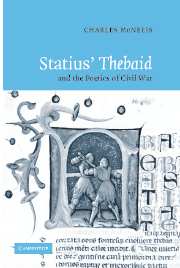Epilogue
Published online by Cambridge University Press: 22 September 2009
Summary
Martial, a contemporary of Statius, explicitly states that Greek myth and Callimachus' Aetia are irrelevant to Roman life:
Qui legis Oedipoden caligantemque Thyesten,
Colchidas et Scyllas, quid nisi monstra legis?
Quid tibi raptus Hylas, quid Parthenopaeus et Attis,
Quid tibi dormitor proderit Endymion?
Exutusve puer pinnis labentibus? aut qui
Odit amatrices Hermaphroditus aquas?
Quid te vana iuvant miserae ludibria chartae?
Hoc lege, quod possit dicere vita ‘Meum est.’
Non hic Centauros, non Gorgonas Harpyiasque
Invenies: hominem pagina nostra sapit.
Sed non vis, Mamurra, tuos cognoscere mores
Nec te scire: legas Aetia Callimachi.
Epigram 10.4You who read about Oedipus and Thyestes in the dark and the women of Colchis and Scyllas, what do you read except monstrosities? What good will ravished Hylas be to you, or Parthenopaeus and Attis, or Endymion, he who sleeps? Or the boy stripped of his wings that drop, or Hermaphroditus who hates the amorous waters? Why do the empty pretences of a wretched page please you? Read this, about which life is able to say ‘It's mine.’ Here you will not find Centaurs or Gorgons or Harpies: my page knows people. But, Mamurra, you do not want to know yourself or your own behaviour: you should read Callimachus'
AetiaIn particular, the Thebaid seems to be taken to task. Parthenopaeus and Oedipus, for example, call to mind Statius' epic, and specific words evoke Statius' style.
- Type
- Chapter
- Information
- Statius' Thebaid and the Poetics of Civil War , pp. 178 - 179Publisher: Cambridge University PressPrint publication year: 2007



